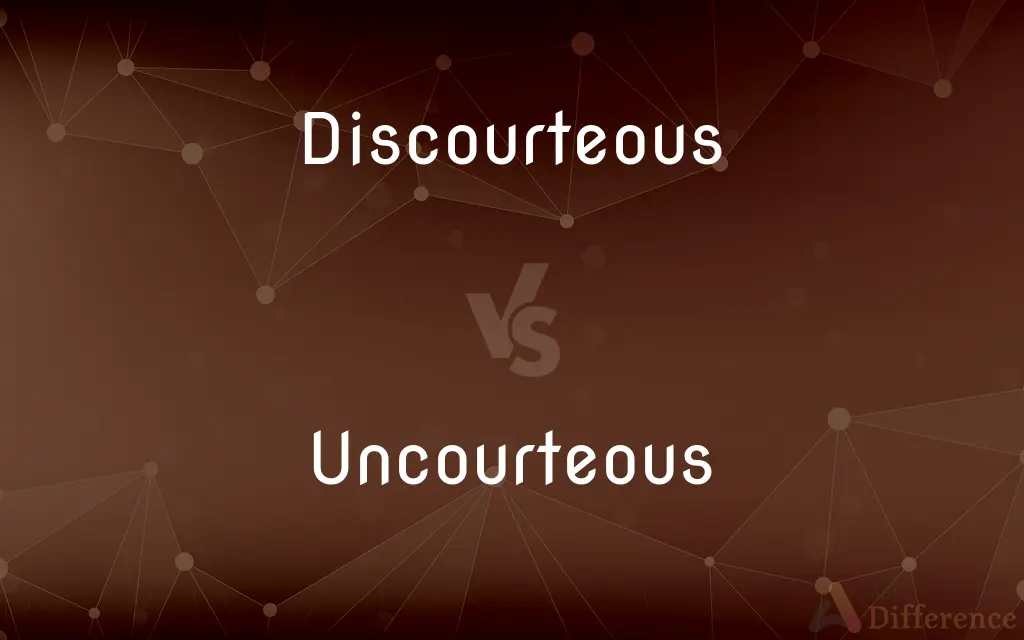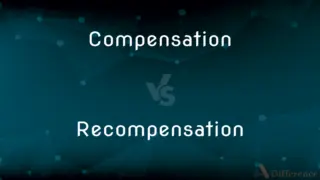Discourteous vs. Uncourteous — What's the Difference?
By Urooj Arif & Maham Liaqat — Updated on March 29, 2024
Discourteous behavior is intentionally or negligently rude, showing a lack of politeness or consideration, while uncourteous often implies a more passive absence of courtesy, possibly due to ignorance or oversight.

Difference Between Discourteous and Uncourteous
Table of Contents
ADVERTISEMENT
Key Differences
Discourteous actions are marked by an active disregard for others' feelings or social norms, suggesting an element of rudeness that is either intentional or stems from a careless attitude. This could manifest in actions such as interrupting someone while they speak or making disparaging remarks. On the other hand, uncourteous behavior, while also reflecting a lack of politeness, often suggests a more passive or unintentional quality, such as forgetting to hold the door open for someone following behind.
Discourteousness can be seen in scenarios where there is a clear violation of expected social etiquette, for instance, using one's phone loudly in a quiet public space. This behavior indicates a deliberate choice to ignore the comfort of others. Uncourteous acts, however, may arise from a lack of awareness about certain social expectations or norms, like speaking in a regular tone in places where silence is customary, not out of disrespect but from not knowing the rule.
In professional settings, being discourteous might involve overt actions like publicly criticizing a colleague's ideas without tact. Such behavior not only reflects poorly on interpersonal skills but also disrupts the collaborative atmosphere. Conversely, being uncourteous might be seen in failing to acknowledge a coworker's contribution to a project, not necessarily out of malice but perhaps due to oversight or misjudgment of the situation's requirements.
Social media and online interactions offer another perspective, where discourteous behavior includes trolling or posting insensitive comments with the intent to provoke or offend. These actions demonstrate an active engagement in rudeness. Uncourteous behavior online might involve sharing content without crediting the source, which, while inconsiderate, does not always indicate a deliberate intent to harm or disrespect.
In personal relationships, discourtesy can severely damage connections, as it often involves actions or words that directly hurt or demean another person, such as betraying confidences or insulting remarks. Uncourteousness in these relationships might manifest as forgetting important dates or failing to return messages promptly, which, while hurtful, may not carry the same intent to undermine or belittle.
ADVERTISEMENT
Comparison Chart
Intent
Often intentional or due to negligence
More likely passive or due to ignorance
Context
Violation of social norms or etiquette
Absence or oversight of polite behavior
Professional Impact
Can disrupt workplace harmony
May result from oversight, less about harm
Online Behavior
Trolling, insensitive comments
Failing to credit sources, accidental rudeness
Personal Relationships
Actions or words that hurt or demean
Forgetting dates, not returning calls
Compare with Definitions
Discourteous
Showing a lack of consideration for others.
The guest's discourteous remark about the meal made the host uncomfortable.
Uncourteous
Absence of manners due to ignorance.
The tourist's uncourteous behavior was attributed to cultural differences.
Discourteous
Displaying a blatant disregard for others' feelings.
Making fun of someone's mistakes is discourteous.
Uncourteous
Not adhering to polite norms out of oversight.
Forgetting to hold the door open was seen as uncourteous.
Discourteous
Acting without tact or respect in interactions.
Sending disparaging emails to colleagues is highly discourteous.
Uncourteous
Lacking in politeness, often unintentionally.
His uncourteous failure to thank the waitress was noticed by all.
Discourteous
Intentionally rude or impolite.
His discourteous interruption during the meeting was frowned upon.
Uncourteous
Failing to show consideration without malicious intent.
Not responding to emails promptly can be seen as uncourteous.
Discourteous
Neglecting social norms of politeness.
Playing loud music in a quiet café is considered discourteous.
Uncourteous
Showing a passive disregard for courtesy.
Leaving the mess for others to clean up was uncourteous.
Discourteous
Exhibiting no courtesy; rude.
Uncourteous
Not courteous; impolite, rude.
Discourteous
Impolite; lacking consideration for others
Discourteous
Uncivil; rude; wanting in courtesy or good manners; uncourteous.
Discourteous
Showing no courtesy; rude;
A distant and at times discourteous young
Discourteous
Lacking social graces
Common Curiosities
Can someone be uncourteous without realizing it?
Yes, someone can be uncourteous without realizing it, often due to ignorance or oversight.
Can online behavior be discourteous?
Yes, online behavior can be discourteous, such as posting insensitive comments or trolling with the intent to offend.
How does discourteous behavior affect professional relationships?
Discourteous behavior can disrupt workplace harmony and damage professional relationships by showing disrespect or lack of consideration.
Is being uncourteous always a negative trait?
Being uncourteous is generally viewed negatively, as it reflects a lack of politeness, though it might not always stem from malicious intent.
Does the intent matter in distinguishing between discourteous and uncourteous behavior?
Yes, intent often matters, as discourteous behavior is more likely to be intentional or negligent, whereas uncourteous behavior might stem from ignorance or oversight.
What role does empathy play in avoiding discourteous behavior?
Empathy plays a significant role in avoiding discourteous behavior, as it involves understanding and considering others' feelings and perspectives.
What is an example of discourteous behavior in social settings?
An example of discourteous behavior in social settings is using one's phone loudly in a quiet public space.
Is forgetting to reply to messages considered uncourteous?
Forgetting to reply to messages is generally considered uncourteous, reflecting oversight rather than intentional rudeness.
Can one's upbringing influence their likelihood of being discourteous or uncourteous?
Yes, one's upbringing can influence their likelihood of being discourteous or uncourteous, as it shapes their understanding of politeness and social norms.
What makes behavior discourteous?
Behavior becomes discourteous when it shows a clear lack of consideration for others, either intentionally or through negligence.
Can uncourteous behavior be misconstrued as discourteous?
Yes, uncourteous behavior can be misconstrued as discourteous, especially if the observer is unaware of the unintentional nature of the act.
How can businesses ensure their employees are not being discourteous to customers?
Businesses can ensure their employees are not being discourteous to customers by providing training on customer service etiquette and the importance of politeness.
How can one correct uncourteous behavior?
Correcting uncourteous behavior often involves becoming more aware of social norms and actively working to be more considerate of others.
How do cultural differences affect perceptions of discourteous and uncourteous behavior?
Cultural differences can significantly affect perceptions of what is considered discourteous or uncourteous, as norms of politeness vary widely across cultures.
Share Your Discovery

Previous Comparison
Seal vs. Sill
Next Comparison
Compensation vs. RecompensationAuthor Spotlight
Written by
Urooj ArifUrooj is a skilled content writer at Ask Difference, known for her exceptional ability to simplify complex topics into engaging and informative content. With a passion for research and a flair for clear, concise writing, she consistently delivers articles that resonate with our diverse audience.
Co-written by
Maham Liaqat















































